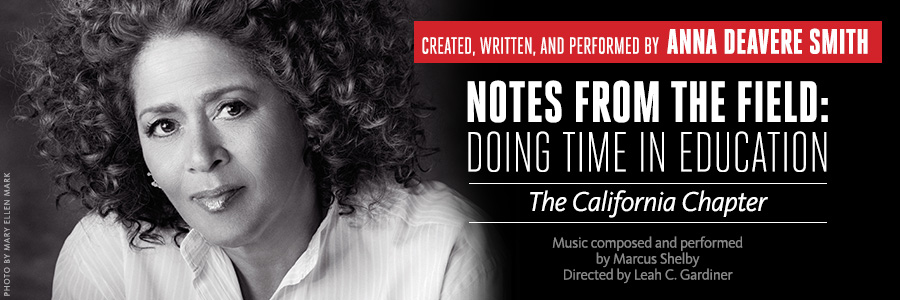
ANNA D. SMITH’S INTERACTIVE FORM OF THEATER
One-Woman Show with Multiple-Person Interviews
BERKELEY — For an all too short run ending August 2, Anna D. Smith’s new one-woman show was launched at the Berkeley Rep.
True to all of Smith’s previous works, “Notes from the Field: Doing Time in Education, The California Chapter” deals with important societal issues. It is told through a series of interviews where Smith plays the parts of interviewees, school officials, police officers, juvenile criminals and other people culled from the over 150 interviews that Smith conducted. The story comes out that there is a “school-to-prison pipeline” for under privileged minorities. The schools kick them out, they are on the streets, often the drug dealers put them to work, and many of them end up in prison. It’s an endless cycle.
Smith turns to the audience and asks us what is to be done. The two and a half hour play has an innovative structure. Smith performs the many characters for the first hour. We break for a 25 minute intermission and go to different areas in the theater (rooms, corners and other available spaces) where we sit in a circle with a leader who probes us with questions.
“What is the take-away? What are you feeling about the situation? What are you going to do about it?”
Being a Berkeley crowd, the members of my group diligently took up the pads and pens and started to write down their feelings and proposals. Some (mostly men) shouted out what they came up with. Everyone was given an assignment at the end to promise to “change” what is going on and personally do something about it.
The play and the group reminded me of those encounter groups of the 70s. People in the audience were made to feel guilty and then collectively asked to solve the problem — as much as they can. A bit too churchy — the punitive kind — for me. But then again it raises the question for me of what is theater. I remember studying the work of Berthold Brecht where he tried the same techniques with his fully staged works but the encounter groups. It was called Agitprop and the intent was also to change society.
The evening ends with a short, 20-minute third act with Smith again going on with other interviews. Throughout the performance Smith sometimes interweaves interviews with people involved with each other or at times she repeats a character, bringing his story up to date. Maybe she could skip the repeats of Tao, for example, the Native American as the audience got the point the first time around.. At times videos of police brutality are shot on a screen above and in an attempt to be fair, and although most of the videos are of police abusing minorities, she does have clips of the out-of-control, senseless rioting in Baltimore. But her point is that it is society’s fault that any of this took place at all.
Anna D. Smith is an institution. When she was the young Stanford graduate and brought her works to stage, also based on interviews, there was a lot of humor in them such as her impersonation of Al Sharpton. As she has grown older, and more imposing in body, stance and conviction, the humor is left out and she is dead serious about the problem we face with kids cycling through the schools-to-prisons pipeline. Will they ever get out and contribute to our American society or will we be paying for the justice system (judges, counselors, prisons) forever without hope?
Local jazz bassist , activist, composer and bandleader, Marcus Shelby provides background music, always in the minor key as fitting the subject. He stands on stage throughout the work. Leah C. Gardiner, a New York theater personality, directs the play.
But it is Smith’s work. She is a masterful impersonator. For whomever she mimics she creates convincing portraits be they politicians, judges, legal defense workers, city councilmen, teachers, principals and the criminals/victims of society. She changes into their characters instantly with the mere suggestion of a light change.
Smith is a MacArthur Genius Award winner, a winner of the National Humanities Medal from President Obama and a skilled writer, director and performer. For her acting alone, her works, many of which have been produced for PBS, are important and should be experienced.
“Notes from the Field: Doing Time in Education, The California Chapter” at BerkeleyRep.org or 510 647 2949.
#
© Carol Benet 2015
Carol Benet is a regular theater reviewer for artssf.com.
These critiques appearing weekly (or sometimes semi-weekly, but never weakly)focus on theater, dance and new musical creativity in performance, with forays into recordings by local artists, and a few departures into books (by authors of the region)as well.
#